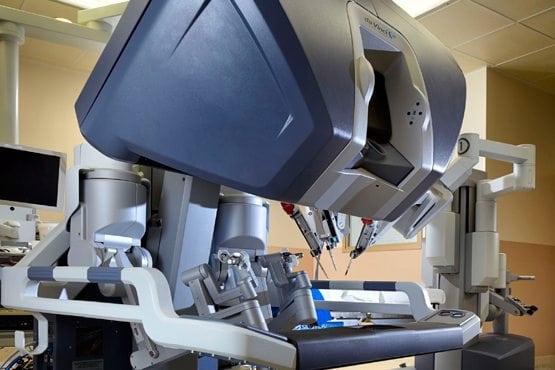With more than 1,600 procedures performed each year with the da Vinci ® surgical robot, Hartford HealthCare surgeons are nationally recognized experts in utilizing the technology and Hartford Hospital’s Center for Education, Simulation and Innovation (CESI) has become a training destination for robotic surgery.
The da Vinci™ Surgical System offers precise, minimally-invasive procedures that can mean less trauma, blood loss and hospital time for the patient. The robotic-assisted surgical device essentially translates hand motions directed by the surgeon at the control console. The system is being utilized at Hartford Hospital, Backus Hospital, The Hospital of Central Connecticut and MidState Medical Center for general surgery, bariatrics, gynecology, urology, thoracic, colorectal and other procedures.
Hartford HealthCare surgeons must follow a rigorous training and credentialing process before being able to operate using the technology, according to Rocco Orlando, MD, Senior Vice President and Hartford HealthCare’s Chief Medical Officer.
“We believe it’s an organizational responsibility to ensure the highest level of training for our surgeons and that our credentialing and privileging process is robust,” said Orlando.
Hartford HealthCare surgeons, if not already trained in residency or fellowship, receive hours of simulation training at CESI combining the same surgeon console used in the OR with a virtual reality environment to teach a variety of exercises and scenarios specifically designed to help users improve their proficiency with the surgeon console’s controls. Every exercise measures user performance, providing detail scoring and feedback at the case conclusion. After simulation training, surgeons must prove their proficiency during live surgery under the direction of a highly-trained proctor before being credentialed on the machine. Once they’ve been cleared to operate, surgeons must continue to demonstrate their skills and are evaluated on their surgical outcomes and volume of cases performed.
“If a surgeon falls below the standard threshold of the number of cases, they will either have to decide to no longer do procedures using the technology or they are required to receive additional training at CESI to verify skills and competency,” Orlando said.
Orlando says rigorous training and credentialing process have translated into positive results for patients.
“We are consistently in the top decile for surgical outcomes nationally. This is incredibly complex and sophisticated technology and our surgeons are the most highly trained in the industry,” said Orlando.
Hartford HealthCare surgeons perform more than 3,000 robotic cases each year using the da Vinci, Mako Robotic-Arm Assisted technology for hip and knee replacement, and Mazor X and ExcelsiusGPS for spine surgery.


